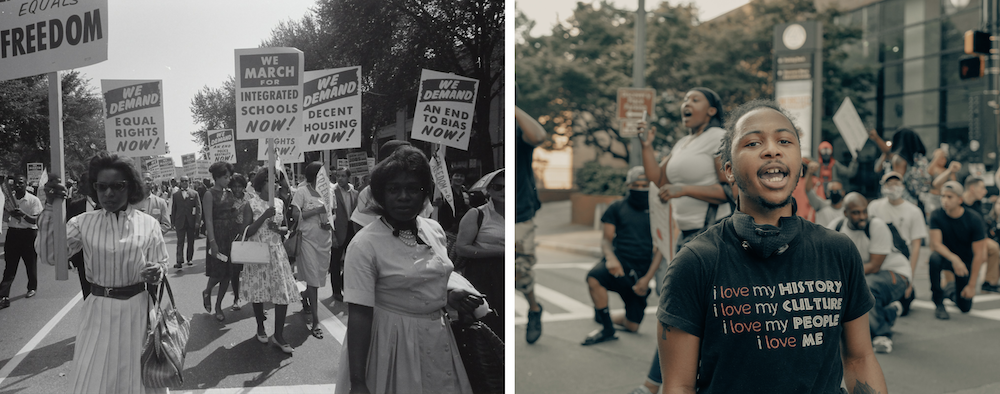
Left: People marching for civil rights in the 1960s; right: People demonstrating for civil rights in 2020 (Unsplash/Library of Congress and Clay Banks)
The death of one American, George Floyd, in May 2020 rocked U.S. society. Most Americans had thought that the momentous Civil Rights Acts of the mid 1960s had altered forever the God-endowed rights of any American citizen.
"Look," we said with pride, "at the incredibly good changes that have occurred in the lives of Black people since then — affirmative action; billionaire Black CEOs and economic giants; university presidents; powerful Black lobbies; elected officials; renowned actors, musicians; even a Black president! Hadn't we proven that prejudice against Black people is over?" Hadn't our Constitution (having skirted the issue of the equality of all under God by specifying that slaves be counted electorally as three-fifths men) been corrected after the bloody battles of the Civil War? Hadn't segregation been expunged forever by the Civil Rights Acts of the 1960s?
George Floyd's horrendous death told us starkly: NO! It told us we have "homework" to do. What happened became, in fact, a catharsis. Those with conscience — especially those of us who are Christian — know that the answer to our questions is NO! Somehow we had ignored the reality — now we cannot.
It is certainly a tragedy that it takes the death of one man to open our eyes and ears to the reality that "man's inhumanity to man" still has such a foothold in our society. That reality shows us an image of Christ in the broken body of George Floyd. It is we who have been brought down to our knees, to the ground. Now so many of us see Christ, dying for the sake of his people. As one of these onlookers, I can see how Floyd's death can be a reminder that God is present in such tragedies . ..that God wants those who love his people to wake up to the realities of our times.
George's death can remind all of us of the passion that brought Jesus' life, death, resurrection, as well as his sending his Spirit of Love to this moment. I think it is no coincidence that George's death happened during the days of our Pentecost season. And that during that season, we were told: "We have homework to do." I agree with Heidi Schlumpf who brought up this idea of homework in National Catholic Reporter when she suggested that the example provided by George Floyd and his killers should require us to change our thinking patterns.
Advertisement
"What should we do?" I asked myself. The answer, for me, is simple. We must pray, meditate and then act as Christ would act. I know from my studies of history that Black American Catholics have practiced this strategy for centuries in the United States. They have given us ample example, just as Floyd's recent four-hour Houston funeral service provided — a ceremony full of sound and contemplative expression, as speakers reminded us of their unique identity with the suffering Christ who prayed and suffered under the law. It is now necessary for all of us to share in the same kind of prayer and meditation. Certainly, we have been witnesses — regardless of our skin color — to the tragedy of his death and the promise of our own new life.
What should our prayer be at this dreadful moment in United States history? I would hope that we would follow the example of the Floyds and their spokesperson at the funeral. Most importantly, we must realize that this is not a time for blame — or for violence. Reactions like those must be left in the past. Let us face this.
As a nation, we have tried to right wrongs by pointing fingers — and where did that get us? Sad to say, it brought us to a Civil War in the 1860s. It brings us now, in the year 2020, to the destruction of whole city blocks across the nation, to the toppling or decapitation of public statues, to the death of bystanders. No, as Christian citizens, our homework must not encompass destructive ways; our homework must be of the meditative kind. We must engage in clear thinking, clear discourse, much conversation, but most importantly, much prayer.
Then, real dialogue among all Americans is possible. These must be conversations that attempt to heal wounded hearts by listening to the Spirit within each of us. There must be a clarification of words. Can we, for example, use the words "systemic racism" or "white privilege?" Can we accept the fact that protest is peaceful, and thus acceptable, but that violence is always destructive? We must ask ourselves: Does name-calling ever help? Does the term "white supremacist" really describe the behavior of most white Americans? How valid is the argument that our nation is systemically racist? Can we really believe that one political party has the whole truth?
And finally, we must ask ourselves: "What would Jesus — who asked us all to "follow him" — say or want of us at this critical moment of our history?" As Pope Francis has recently reminded us: Our task as Christians is to announce the Good News — and to do this not as "narcissists, victims or pessimistic" proclaimers of the fundamental evils in our society. We must be joyful heralds of what is right about our society.
I would suggest that we engage in such prayerful homework. We are simply not a nation intentionally born of prejudice; instead we are a nation whose forefathers wanted to proclaim to their king that their rights as colonists to dignity and respect had been denied. It is our turn to study, to pray and only then to act. How can we live out the brotherhood and sisterhood to which our founding documents aspired? And how can we atone for the deviations that followed? Each of us must ask this question and answer it from the bottom of our hearts and only in the spirit of prayer.
[Dolores Liptak is a Sister of Mercy of the Americas. A published author and archivist, she has a doctorate in American history and has taught in several colleges and seminaries. She served as the organization of women religious archivists' first president and guided it for many years. Several of her books are studies of minorities in the U.S., principally immigrants and women. Two of her major archives projects were the organization of Baltimore Carmel's records and those of the Georgetown Visitation Monastery. Presently she remains a consultant and occasional essayist and author.]







